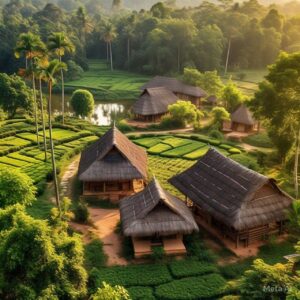
Kerala, India’s green jewel, has once again taken a revolutionary leap — this time by piloting the world’s first fully integrated eco-village model. Blending traditional wisdom with cutting-edge sustainability, the eco-village in Kerala is a living blueprint for eco-conscious living, designed to combat climate change, promote renewable energy, and foster community self-reliance.
This pilot project is not just a dream — it’s a scalable and replicable model for sustainable living that could transform the way communities function around the globe. Set against the scenic backdrop of Wayanad, this eco-village aims to become a climate-resilient community showcasing how modern lifestyles can coexist in harmony with nature.
What Is an Eco-Village?
An eco-village is more than a cluster of green buildings. It’s a self-sustaining human settlement that integrates environmental, social, and economic sustainability. The model incorporates:
-
Eco-friendly construction
-
Renewable energy sources like solar and micro-hydro
-
Zero-waste management
-
Organic and permaculture farming
-
Community governance
-
Water harvesting and greywater recycling
The Kerala eco-village model is unique because it brings all these elements together in a cohesive, community-driven ecosystem that supports local livelihoods while reducing environmental impact.
1. Eco-Friendly Architecture
Homes and public spaces in the eco-village are built using sustainable materials such as mud blocks, bamboo, and reclaimed timber. Architectural designs include passive cooling, natural lighting, and rainwater harvesting structures. These green buildings are cost-effective and climate-resilient, suitable for Kerala’s tropical monsoon climate.
2. 100% Renewable Energy
The eco-village is completely off-grid, powered by a mix of solar panels and micro-hydroelectric systems. Energy consumption is monitored through smart meters to encourage mindful usage. Battery backup ensures power supply even during cloudy days or low-flow seasons.
3. Zero Waste Village
Adhering to a strict zero-waste policy, the community practices complete waste segregation. Organic waste is composted to nourish the farms, while non-biodegradable are sent to recycling units. Greywater is recycled through natural filtration and reused for irrigation and cleaning.
4. Water Conservation
In a state where water security is increasingly critical, the village employs advanced rainwater harvesting systems and community water tanks. A groundwater recharge network has been integrated into the landscape to maintain ecological balance.
5. Organic and Community Farming
Farming is the heart of the eco-village. Residents engage in organic farming and permaculture techniques, avoiding chemical fertilizers and promoting biodiversity. Shared farming plots grow vegetables, grains, herbs, and fruits, ensuring food self-sufficiency.
6. Digital Infrastructure
Blending tradition with technology, the eco-village uses a custom mobile app for resource tracking, local barter, event coordination, and community decision-making. Blockchain is being explored to maintain transparency in community resource usage.
7. Holistic Living and Education
Education in the eco-village isn’t limited to books. Children and adults alike are taught eco-literacy, digital skills, nutrition, and sustainable livelihoods. A community health center, meditation space, and skill training center are part of the social infrastructure.
Community-Led Sustainability
A defining feature of this eco-village in Kerala is its bottom-up approach. Local residents — including tribal groups, women-led cooperatives, and youth volunteers — were part of every decision, from land use to lifestyle norms. This inclusive model of governance ensures cultural continuity, respect for nature, and long-term participation.
Rather than importing solutions, the eco-village builds on local wisdom and resources, fostering ownership and pride in the process.
A Global Benchmark for Sustainable Living
The Kerala eco-village is being closely monitored by global environmental bodies. The United Nations Environment Programme (UNEP) has expressed interest in documenting it as a case study in climate adaptation and rural resilience.
With Kerala’s support, efforts are underway to develop an open-source eco-village framework that governments, NGOs, and city planners can adopt worldwide. Customizable modules include green construction, microgrids, sustainable agriculture, and water management.
Eco-Tourism Potential
Another exciting offshoot of the project is eco-tourism. The village is designed to accommodate limited numbers of eco-conscious travelers interested in volunteering, learning sustainable skills, or just experiencing a different way of life. Activities include:
-
Organic farming workshops
-
Nature trails
-
Bamboo crafts and pottery sessions
-
Sustainable cooking classes
This promotes responsible tourism in Kerala while generating revenue for the community.
Government Support and Vision
The Kerala government has ambitious plans to replicate the eco-village model across the state — especially in climate-vulnerable coastal and hilly regions. Incentives are being considered for:
-
Landowners converting plots into eco-villages
-
Entrepreneurs starting green businesses within these zones
-
NGOs and cooperatives taking leadership in rural sustainability
The Chief Minister recently stated:
“Kerala will lead the way in building climate-resilient, people-powered villages. This model is a solution, not just for our future, but for the world’s future.”
Challenges and Opportunities
Like any pioneering project, Kerala’s eco-village model faces its share of hurdles:
-
Initial setup costs for renewable systems and infrastructure
-
Skill development required for self-governance and tech adoption
-
Behavioral change is needed to transition from conventional habits to sustainable alternatives
However, with growing awareness, policy support, and community enthusiasm, these challenges are being systematically addressed.
As the world struggles with ecological crises, Kerala offers a practical and inspiring alternative — one that balances tradition, innovation, and community spirit. The world’s first integrated eco-village is not just a local achievement; it’s a global milestone that could redefine how we build, live, and interact with the planet.
This pilot isn’t the end — it’s just the beginning of a sustainable revolution. And it started, fittingly, in the lush, enlightened land of Kerala.
